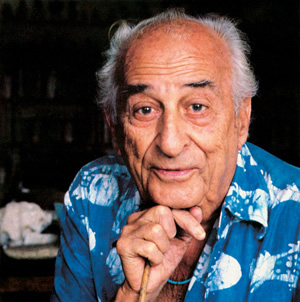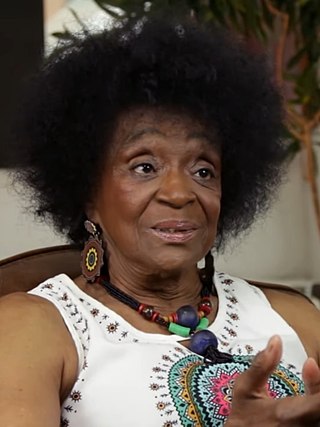Related Research Articles
Olokun is an orisha spirit in Yoruba religion. Olokun is believed to be the parent of Aje, the orisha of great wealth and of the bottom of the ocean. Olokun is revered as the ruler of all bodies of water and for the authority over other water deities. Olokun is highly praised for their ability to give great wealth, health, and prosperity to their followers. Communities in both West Africa and the African diaspora view Olokun variously as female, male, or androgynous.

Michael Babatunde Olatunji was a Nigerian drummer, educator, social activist, and recording artist.

Obba Babatundé is an American actor. A native of Queens, New York City, he has appeared in more than seventeen stage productions, thirty theatrical films, sixty made-for-television films, and two prime-time series.

The University of Lagos (UNILAG) is a public research university located in Lagos, Nigeria, which was founded in 1962. UNILAG is one of the first generation universities in Nigeria and is ranked among the top universities in Africa in major education publications. The university presently has three campuses in the mainland of Lagos. Whereas two of its campuses are located at Yaba, it's college of medicine is located at Idi-Araba, Surulere. Its main campus is largely surrounded by the Lagos Lagoon and has 802 acres of land. As at 2024, the University of Lagos admits around 8,500 undergraduate students annually and enrolls over 57,000 students.
Chief Hubert Adedeji Ogunde D.Lit. was a Nigerian actor, playwright, theatre manager, and musician who founded the first contemporary professional theatrical company in Nigeria, the African Music Research Party, in 1945.

Genevieve Nnaji is a Nigerian actress, producer, and director. She won the Africa Movie Academy Award for Best Actress in a Leading Role in 2005, making her the first actor to win the award. In 2011, she was honoured as a Member of the Order of the Federal Republic by the Nigerian government for her contributions to Nollywood. Her directorial debut movie, Lionheart, is the first Netflix film from Nigeria and the first Nigerian submission for the Oscars. The movie was disqualified for having most of its dialogue in English. After having spent decades in the movie industry, she was profiled alongside some celebrities and business executives in 2020 in two new books by publisher and Editor in Chief of Yes International! magazine, Azuh Arinze.

Héctor Julio Páride Bernabó was an Argentine-Brazilian artist, researcher, writer, historian and journalist. His nickname and artistic name, Carybé, a type of piranha, comes from his time in the scouts. He died of heart failure after the meeting of a candomblé community's lay board of directors, the Cruz Santa Opô Afonjá Society, of which he was a member.

Léa Lucas Garcia de Aguiar was a Brazilian actress. She was known for her numerous television and film roles. Her breakout role was in the 1959 Oscar-winning Black Orpheus, in which she portrayed Serafina, Eurydice's cousin.
Donald Bogle is an American film historian and author of six books concerning black history in film and on television. He is an instructor at New York University's Tisch School of the Arts and at the University of Pennsylvania.

Quilombo is a 1984 Brazilian drama film directed by Carlos Diegues. It was entered into the 1984 Cannes Film Festival. The film is based on the history of the Quilombo dos Palmares, a community of escaped slaves that numbered in the thousands during the 17th century in north-eastern Brazil.
Ola Balogun is a Nigerian filmmaker and scriptwriter. He also ventured into the Nigerian music industry in 2001. Balogun, who has been making films for more than three decades, is part of the first generation of Nigerian filmmakers.

Surulere is a local government area located on the mainland in Lagos State, Nigeria. It has an area of 23 km2 (8.9 sq mi). At the 2006 census, there were 503,975 inhabitants, with a population density of 21,864 inhabitants per square kilometer. The local government area is bordered by Yaba, Mushin, and Ebute-Metta.

Ijé or Ijé: The Journey is a 2010 Nigerian drama film directed by Chineze Anyaene and starring Omotola Jalade-Ekeinde, Genevieve Nnaji, and Odalys García.

Maami is a 2011 Nigerian drama film produced and directed by Tunde Kelani. It is based on a novel of the same name, written by Femi Osofisan, and adapted to screen by Tunde Babalola. It stars Funke Akindele as Maami, along with Wole Ojo and Olumide Bakare. Though the film was a commercial failure, it was generally met with positive critical reviews.

In 2015, the Brazilian Film Critics Association (Abraccine) published a list with the 100 best Brazilian films ever according to the votes of its members. This poll was the basis for a book named The 100 Best Brazilian Films, published in 2016. The idea of the ranking and the book was suggested by publisher Letramento, with whom Abraccine and television network Canal Brasil co-released the book. The ranking was done based on individual lists done by Abraccine's 100 critics, who initially mentioned 379 films. The full list was first made available to the public on 26 November 2015, and the book was released on 1 September 2016.

Adunni Ade is a Nigerian American actress and model. She was born on the 7th of June 1976 in Queens, New York to a German American mother and a Nigerian father from Lagos.
The Trófeu Raça Negra is a Brazilian award which is handed out to individuals and groups who have contributed or exhibited advancements for Afro-Brazilians. Organized by the NGO Afrobras, it was first handed out in 2000 on the 500th anniversary of the European arrival in Brazil, and has been held annually since 2004. It is similar to the NAACP Image Award in the United States.
References
- ↑ "Black Goddess". HappyHome. Lagos: Punch Newspapers. October 1978.
- ↑ Maslin, Janet (1980-04-18). "Film: 'Black Goddess':Search for Ancestors". The New York Times. ISSN 0362-4331 . Retrieved 2023-11-28.
- ↑ Sandler, Kathe (January 6, 1979), New nigerian film, New York Amsterdam, p. d9
- ↑ Maslin, Janet (April 18, 1980), "Film: 'black goddess'", New York Times, p. c6